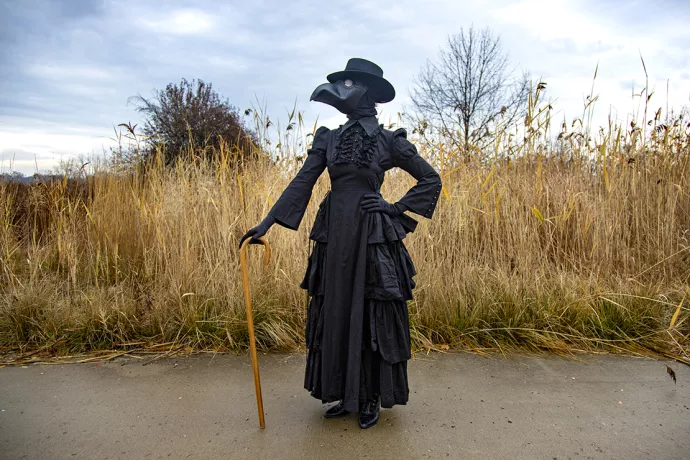
Let's Talk About Health: UTM lecturer brings new video series, costumes and creativity to online anthropology class
Have you heard the one about the U of T Mississauga lecturer talking about the challenges of online teaching in a Zoom call that is abruptly disconnected?
“There you have it,” laughs Madeleine Mant when the conversation resumes. “Just one of the reasons why the pivot to online learning still feels like a huge challenge.”
Technology glitches aside, it’s a challenge she’s both ready and willing to take on — and not just because her Introduction to the Anthropology of Health class, offered this fall during a global pandemic, also includes a unit on infectious diseases.
A research associate in UTM’s Department of Anthropology, Mant approaches every teaching assignment, no matter how timely the topic, as an opportunity for student engagement.
“I realized early on that having a well-written 50-minute lecture wasn’t enough. When students haven’t done the readings or technology fails, the improvisational, organic aspect of teaching becomes even more important.”
In her Anthropology of Infectious Diseases class, for example, she’s been known to don costumes and adopt the persona of a war nurse or mother asking whether to vaccinate her child against polio. She also assigns small groups of students 10 minutes to research a topic such as medical assistance in dying (MAID) or overdose prevention sites and then five minutes to create a poster to present to the class.
The results — the MAID team drew a heart linking a stethoscope and a hospital bed — left Mant speechless.
“I was blown away by the sensitivity and how well the students took ownership of their learning and their responsibility to deliver a message to their peers and get them talking.”
The key, she says, is building a community of trust that includes plenty of dialogue.
Those goals don’t change now that classes are online. In fact, Mant believes they are even more important when everyone is learning from home.
“We need to be both flexible and creative,” she says.

With around 100 students registered for her introductory class this fall, that means offering synchronous lectures and small group tutorials that are recorded for those who are unable to attend. Virtual classes will include live polls, a moderated chatroom and some of the same interactive activities and visual cues Mant employs in the physical classroom — including her black leather plague mask.
She’s also planning a “Let’s Talk About Health” video series to introduce students to the wide world of health careers. Funded by a UTM Teaching Development and Innovation grant, the weekly series will feature a pharmacist, a midwife, a public health nurse and a health geographer, among other health experts.
But Mant reserves her biggest excitement for an assignment celebrating the 100th anniversary of the Nobel Prize-winning discovery of insulin at the University of Toronto in 1921.
Students will tell the story of this defining moment in Canadian history with an essay or an “unessay,” a piece of art, a song or a sketch, to name just a few possibilities. Their work will be showcased on a national scale through the digital community, Defining Moments Canada, where Mant serves as chair of the academic advisory board.
While she admits it’s “surreal” to be teaching about the anthropology of health and infectious diseases during a global pandemic, she says it’s also a privilege.
“We’re living through history right now. This is our chance to think about the role we’d like to play and how we can take the lessons of the past and apply them to the present.”
Wi-Fi permitting, of course.
